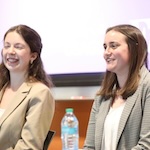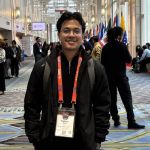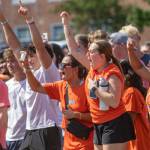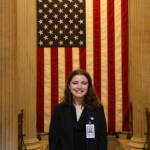
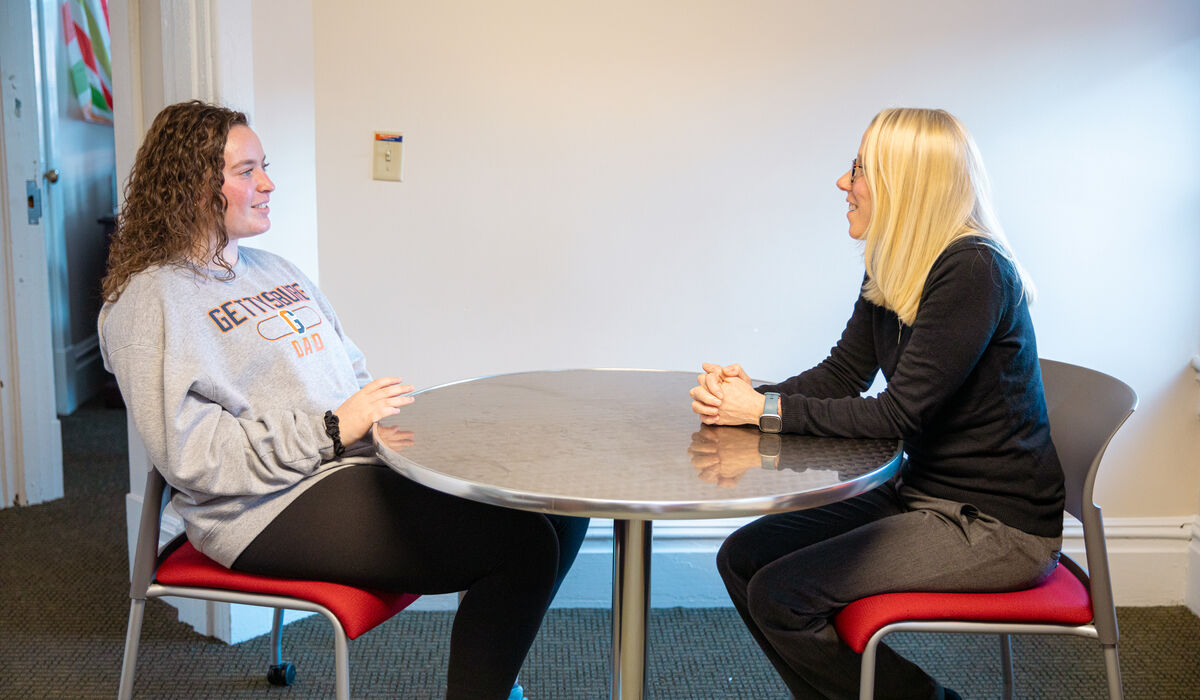
Through Gettysburg College’s Guided Pathways, students receive support from co-curricular advisors who help them connect their interests with the experiences they want to have and the enduring skills they want to build.
From the first to the final semester, Gettysburg College students engage in work that fuels their interests and desires for learning and doing. Whether participating in internships, conducting student-faculty research, competing in athletics, or performing in the recital hall, they find many opportunities to get involved on and off campus. During their four years here, students can intentionally align what they do with the skills they want to build.
Co-curricular advisors are invaluable for helping students participating in the Guided Pathways envision their Gettysburg education holistically. These advisors bridge the connection between all they want to do today and all they hope to do in the future.
Think about your ‘why’
When students embark on their Guided Pathways journey, they take the beginning steps that will lead them through a process of inquiry and self-discovery. Through the Gettysburg Approach, they gain knowledge, enduring skills, and experiences that will allow them to pursue consequential lives.
Co-curricular advisors work with students to align their interests with experiences through thematic Guided Pathways. Their goal is to enable students to understand better how their courses and activities connect with the knowledge they’re gaining and skills they’re building. These advisors are integral members of students’ Personal Advising Teams, consisting of a faculty advisor, a career advisor, and, at the conclusion of their sophomore year, an alumni mentor.
“I find out if they know what they want to do and make suggestions of experiences outside of the classroom, or experiences in the community or on campus, that might help augment their academic experiences toward their career goal,” said Senior Co-Curricular Advisor Cara Smith, who helps students to see the big picture of their Gettysburg education. “It’s helping students to think about their ‘why’ and what they want to do to get to their ‘why.’”
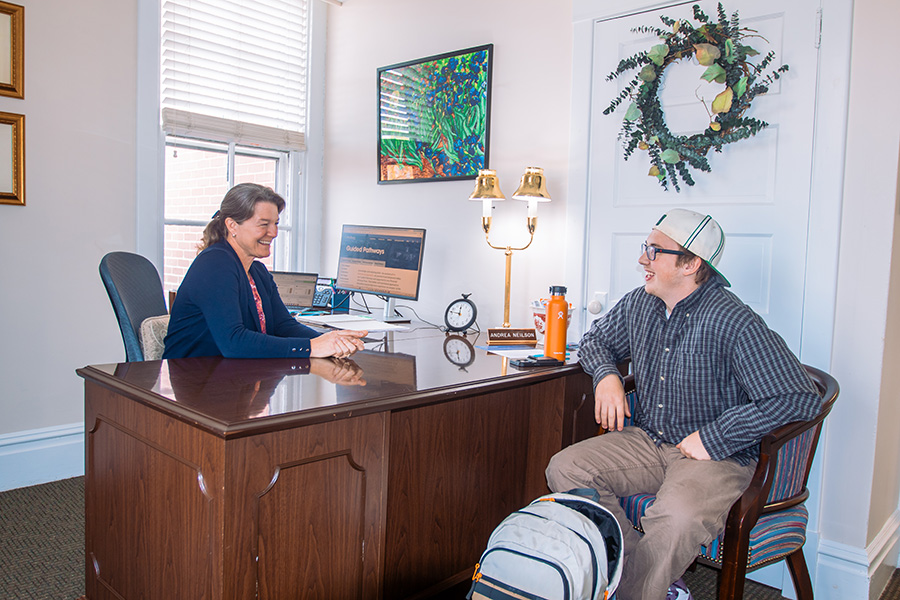
Make connections between doing and learning
As a first-year student participating in the Guided Pathways, Max Stone ’28 of Westminster, Massachusetts, is studying history and political science and has an intention of going to law school. During his first meeting of the Fall 2024 semester with Andrea Neilson, he learned about co-curricular experiences, such as the Pre-Law Club and Model UN, that would support his academic interest and help him develop the critical thinking skills necessary for a future legal career.
“As an advisor, I help students to think intentionally about their experiences and the skills they are developing,” said Neilson.
Neilson also showed Stone how activities he was already participating in, such as volunteering for a local food pantry once a week, can be incredible experiential opportunities because they can be done consistently. She advised him to reflect on these experiences and their potential lifelong impact.
“When volunteering, I’m thinking about putting my cans away, but in reality, I’m making connections with my community. I’m helping my community and feeling more like a part of it. It’s good to look back with hindsight and reflect on everything. It helps you better put into perspective what you’ve just done,” said Stone. “I think the value of understanding the people you work with and work for is a great thing to have as a lawyer. A lawyer who can be one with the community can truly make a difference.”
Provide balance amid activities
Morgan Nieman ’27 of Waldwick, New Jersey, appreciates the value of diversifying student experiences and balancing the co-curricular opportunities Gettysburg offers with her studies. As she participates in her second year of the Guided Pathways, the ability to reflect on and evaluate her experiences becomes even more important to her.
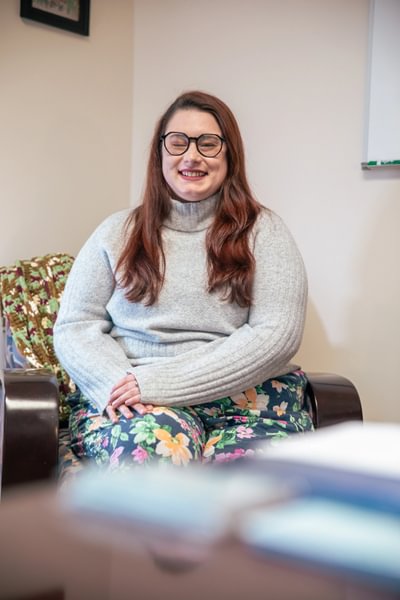
“When I talked to my co-curricular advisor, Dani Delcini, she made me realize that I was putting too much on myself at the start of this semester,” said Nieman, a biochemistry-molecular biology major pursuing a pre-veterinary track. “I decided to push the formation of my new club, Zoology Club, back so that I could focus on my academics and other commitments. Dani’s guidance in these co-curricular activities allowed me to reflect and learn from her advice.”
Nieman followed Delcini’s advice to balance all her activities while still broadening the depth of her experiences beyond academics. She committed to serving as vice president of events and finances for Her Campus, working as a barista for the Gettysburg Chocolate Market in downtown Gettysburg, and participating in the Pre-Veterinary Club. Last summer, she was as a research fellow through the Cross-Disciplinary Science Institute (X-SIG).
“The co-curricular advisors contribute to my Gettysburg education by guiding me in the best way to have a well-balanced lifestyle during my college career,” said Nieman. “They help students become well-rounded individuals.”
“When choosing activities, it is important for students to identify experiences that are fulfilling to them and will not only bring them joy, but also serve as a way to learn skills and build community,” Delcini said. “To navigate these choices, I help students consider the best ways to manage their time and focus on excelling in key areas of interest, so they are able to get the most out of select opportunities.”
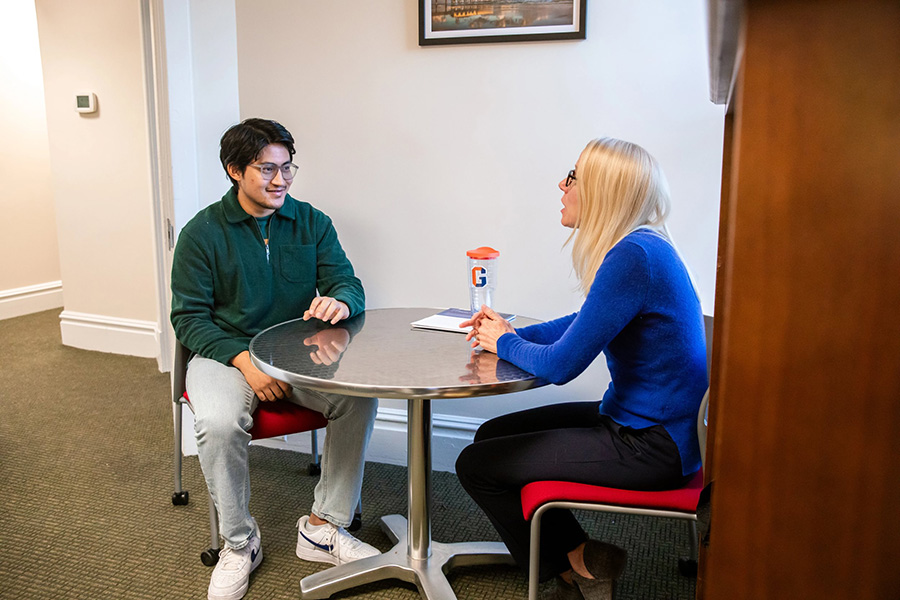
Reflect and grow
For Sanij Shrestha ’26 of Hattiban, Nepal, Gettysburg’s Computer Science Department stood out during his college search. He was drawn to the depth of knowledge and the rigorous curriculum it would offer him. Upon transferring to Gettysburg, however, Shrestha was uncertain where to begin connecting with the College or learning about outside-the-classroom experiences that would enhance his academics. The Guided Pathways helped him make these connections.
With the support of his co-curricular advisor, Cara Smith, Shrestha learned to navigate the wealth of co-curricular opportunities available to him and focus on activities that align with his career goals. He is also among the first group of recipients for the new Guided Pathways Fund and has received funding toward his study abroad experience next semester.
“Through our regular meetings, I’ve gained clarity about my professional path and developed a better understanding of how to translate my college experiences into marketable skills,” he said. “[This] mentorship has helped me reflect more deeply on each activity and see connections I might have missed on my own.”
As a member of the Computer Science Club and a hackathon competitor, Shrestha used Smith’s guidance to reflect on the skills he learned throughout his co-curricular activities so that he can be even more intentional about his activity selections in the future and present his skills effectively.
“Reflection is more than just remembering what happened. It’s about understanding how experiences shape who I’m becoming,” said Shrestha. “Through the Guided Pathways, I’ve learned that meaningful reflection helps me connect different activities and see how each contributes to my personal and professional growth.”
Related Links:
By Michael Vyskocil and Katie Lauriello ’25
Photos by Marc Belli, Abbey Frisco, and Corey Jewart
Posted: 12/19/24
